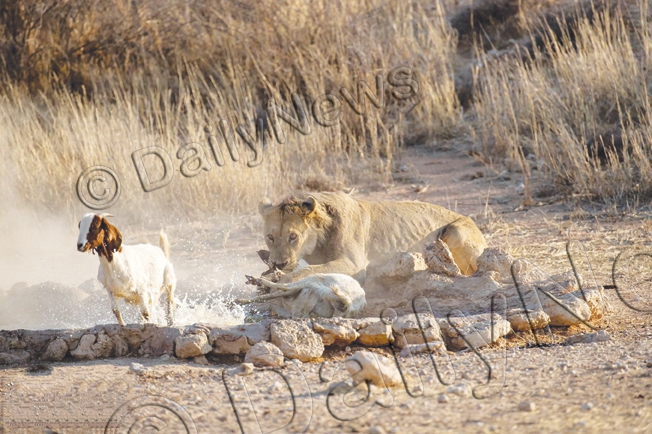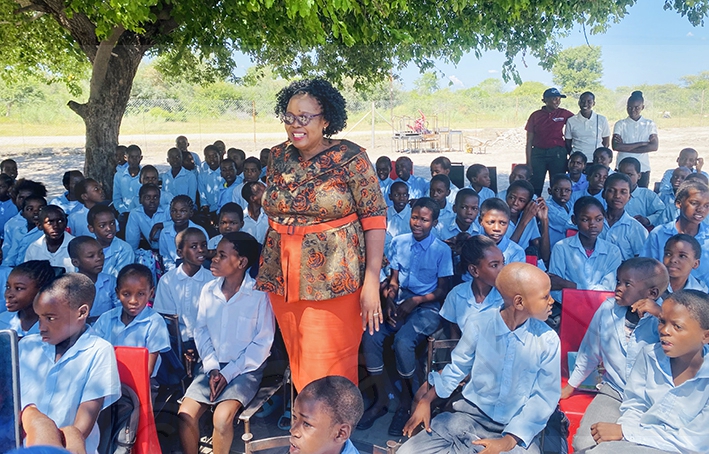Tackling human- wildlife conflict in KTFP
02 Oct 2024
In the peripheries of the Kgalagadi Transfrontier Park (KTFP), just near the wildlife management areas, the thin interface between humans, domestic animals and wild animals exists, resulting in a long ‘unending war’ between wildlife and humans.
As such, government continues to device interventions to tackle the problem, as human-wildlife conflict is one of the most pressing issues facing biodiversity conservation and sustainable development today.
Department of Wildlife and National Parks, chief wildlife officer for Kgalagadi Mr Mooketsi Solomon admitted that there was a serious challenge of human-wildlife conflict especially in farms near the park, which became rampant during the winter season.
From 2020-2024, Kgalagadi recorded 299 human-wildlife conflict cases where lions, wild dogs and leopards were the most problematic.
Farmers lost a total of 244 cattle, 150 sheep and goats as well as 83 horses killed by predators.
“We have identified the conflict hot spots where we have begun to deploy wildlife staff in those areas. Staff members will now not be seating in the offices waiting for reports. They would now be strategically positioned in hotspot areas to attend to cases close by,” he said.
He said even if there were no reports, they would be positioned there and would rotate every two weeks to deal with the challenge. They are expected to find the predators and translocate them inside the park to avoid farmers killing them at an alarming rate.
Mr Solomon highlighted that they have come up with new plans to deal with the rampant human-wildlife conflict.
“We are now going to have Forward Operating Bases, which are temporary camps in areas where incidents occur. We have committed officers that will now be going into trips to stay in the camps for about 15 days. This we hope will reduce the conflict,” he said.
He reasoned that waiting in the office for reports caused delays in tackling the problem swiftly as it was a challenge to mobilise resources timely, causing farmers to be agitated and end up killing the animals in defense.
The move, he said, would improve communication and response time as wildlife officers would be visible in farms moving around in conflict hotspot areas and interacting with farmers and building rapport to make farmers feel safer.
He highlighted that predators were complicated animals and very smart as they would strike domestic animals at night and return back to the park, hence they must think ahead.
Furthermore, Mr Solomon underscored the development of an all-encompassing, robust National Human Wildlife Conflict strategy, which incorporated community ideas to end human wildlife conflict, which they stood ready to implement once passed in Parliament.
He said government paid large sums of compensation to farmers, which were depleted within a short period of time, adding that people affected by human wildlife conflict complained that the compensation rates were too low.
Mr Solomon said hence the need for effective implementation of solutions once the National Human Wildlife Conflict strategy was completed.
He said some of the suggested solutions to human-wildlife conflict by the Khawa community were that the Khawa Kopanelo Development Trust hunting quotas include a lion.
This, he noted, could also help allay the human-wildlife conflict, as the lion population was high at Mabuasehube.
Furthermore, on other interventions, he said plans were underway to maintain the predator proof fence between Khawa and the Kgalagadi Transfrontier Park.
“We recently sat with our South Africa counterparts as we share the park and prioritised our challenges. The German International Cooperation (GIZ) proposed to assist us with biodiversity conservation in a three-year project to benefit both South Africa and Botswana and we highlighted predator proof fence as a need,” he said.
Moreover, he said the United Nations Development Programme through the Kgalagadi Ghanzi Drylands Ecosystem Project, had provided funds for construction of 12 predator proof kraals for the beneficiaries, where six would be constructed at Struizendam while the other six would be at Khawa.
They were nominated due to high numbers of their livestock predation, he added.
He said currently, camping equipment and cage traps had been procured through the drylands project, which would assist the department to control problematic animals to avoid direct and recurring threat to the livelihood or safety of people and their livestock. ENDS
Source : BOPA
Author : Calviniah Kgautlhe
Location : TSABONG
Event : INTERVIEW
Date : 02 Oct 2024






